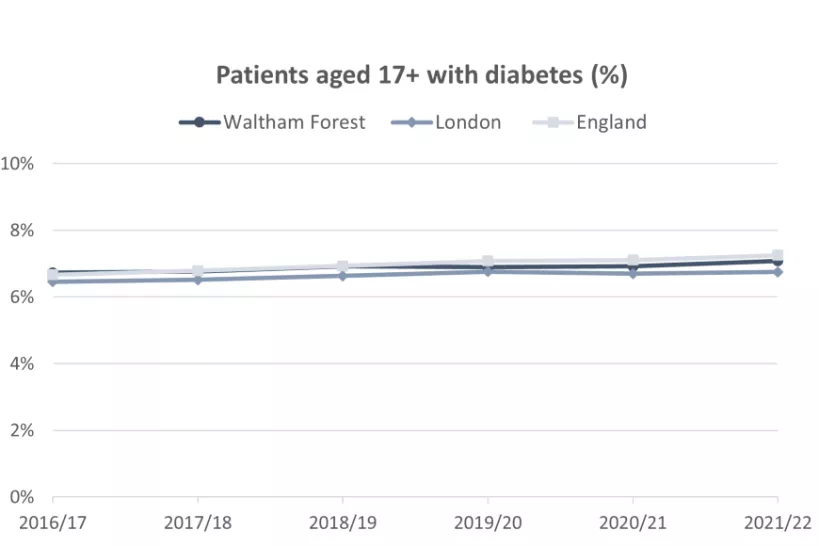Last updated: 3 December 2024
Next review: 3 June 2025
This content is part of the Waltham Forest JSNA. To see other JSNA content, visit the JSNA landing page
Diabetes is a condition where the amount of glucose in the blood is too high - over time, this can cause damage blood vessels and organs, which can result in a range of complications such as sight loss, heart attack, stroke, foot problems and kidney problems.
There are two main types of diabetes. Type 1 diabetes is a lifelong condition where the body is unable to produce the hormone insulin, which controls the absorption of glucose from the blood. Type 2 diabetes is a condition where body does not produce enough insulin or does not react to insulin properly. It is estimated that around 90% of diabetes cases are type 2. Being overweight or obese, age, ethnicity and family history are some of the risk factors of type 2 diabetes. Type 2 diabetes can be prevented or delayed through lifestyle changes (exercise, weight loss, healthy eating), whereas type 1 diabetes is not related to diet or lifestyle and cannot be prevented [1].
Diabetes affects nearly 3.6 million people in England in 2021/22, this equates to 7.3 % of the national population above the age of 17 years.
In 2021 to 2022, 7.1% of patients registered with a Waltham Forest GP were diagnosed with diabetes mellitus (type 1 or type 2). This was lower than the national average (7.3%) but higher than across London as whole (6.8%). In the last five years, the prevalence of diabetes has increased in Waltham Forest from 6.7% in 2016 to 17 to 7.1% in 2021 to 2022, mirroring the rising trend across London and England. Previous estimates published in 2018 indicate that Waltham Forest had a lower diabetes diagnosis rate (65.8%) compared to both London (71.4%) and England (78%). This means that approximately one-third of individuals with diabetes in Waltham Forest were thought to be undiagnosed.

Source:OHID Public health profiles. Data from Quality and Outcomes Framework. Date accessed: 27 March 2023.
Note: Recorded disease prevalence on GP patient registers is influenced both by the underlying prevalence of the condition in the wider population and the extent to which these cases have been diagnosed and recorded on primary care systems.
References:
[1] Diabetes UK. Diabetes mellitus. Date accessed: 08 June 2023